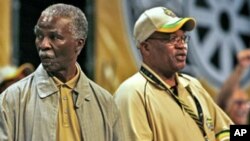South African President Jacob Zuma and Zambian President Rupiah Banda jointly called on the West to lift sanctions targeting Zimbabwean President Robert Mugabe and his inner circle, saying they were hindering regional efforts to end the Harare crisis.
Speaking after a round of bilateral discussions on Zimbabwe in Pretoria, the leaders told reporters that ending Western travel and financial sanctions was the key to resolving the latest crisis which has put Zimbabwe's power-sharing government at risk and could potentially tip the country into elections for which it is ill-prepared.
Mr. Banda, chairman of the Southern African Development Community's troika on politics, security and defense, said the committee, of which Mr. Zuma is also a member along with Mozambican President Armando Guebuza, will meet formally in January.
That announcement was likely to disappoint the Movement for Democratic Change formation of Prime Minister Morgan Tsvangirai, which has been urging the troika and the larger SADC regional organization to energetically address the situation in Zimbabwe.
The national unity government in Harare is fast approaching its second anniversary of its launch in February 2009, and Mr. Mugabe has declared that there are so many disputes within the government that it is time to end it and proceed to new elections.
But the political leadership has yet to produce a draft of the new constitution which was one of its main tasks under the September 2008 Global Political Agreement which laid the foundation for the unity government, and political divisions remain sharp.
Mr. Zuma has urged the three co-governing parties in Harare to continue discussions and prepare a road map to the next round of elections rather than rushing forward and risking another inconclusive and traumatic ballot like that seen in 2008.
Southern African leaders have called before this for Western sanctions to be lifted, but had not so closely linked this to their ability to produce results in Harare.
"I believe that we still can find a solution," Banda said. "We are united in calling for the lifting of the embargo on the leaders, their travel and trade with Zimbabwe. We think it is counter productive and that it is hitting the wrong people."
Mr. Zuma, who was in Harare late last week for consultations, said President Mugabe told him he wants a rapid resolution of the crisis. The South African leader said that all parties in the unity government are now looking forward to new elections.
Pretoria-based political analyst George Mkhwanazi told VOA Studio 7 reporter Ntungamili Nkomo that in putting off the next troika meeting until January, Banda did not appear to be treating the political crisis in Harare as a priority. "It's very dissapointing to note that those charged with the responsibility of bringing a settlement in Zimbabwe have chosen not to take the issue with a sence of urgency," Mkhwanazi commented.
In Zimbabwe, meanwhile, Mr. Tsvangirai's MDC issued a statement telling Mr. Mugabe's former ruling ZANU-PF that it must desist from political violence or risk retaliation, this amid reports of violence from a number of the country’s provinces.
It said those committing violence are “spoiling for conflagration and unnecessary mayhem from which ZANU-PF would certainly emerge as a crying loser.”
Mbare, Harare, remained tense after ZANU-PF youth ejected MDC loyalists from their stands at the Bloom Gate flea market on Wednesday. Sources said an MDC member died in Mbare on the weekend at the hands of ZANU-PF militants and police.
The Harare City Council said marauding ZANU-PF youths invaded Carter House, a center for long distance traders, to hoist their party flag. They were also said to have invaded a location where another flea market is slated for construction.
In Muzarabani, Mashonaland Central province, sources said six teachers escaped after state security agents tried to kidnap them for allegedly defying ZANU-PF orders not to state their views on constitution revision in a recent public outreach process.
The Zimbabwe Peace Project said the military has bolstered its presence in villages and that youth militia tied to ZANU-PF have set up torture camps in some areas, evoking memories of 2008 when such militia terrorized rural populations.
Julius Mawarire, one of the teachers who escaped from Rushinga, Muzarabani district, said in an interview that he has gone into hiding fearing for his life.
John Murukai, a retired army captain and a ZANU-PF supporter, told VOA that the MDC started the chaos by barring ZANU-PF supporters from operating stands at local flea markets. The populous Mbare suburb is an MDC stronghold in political terms.





